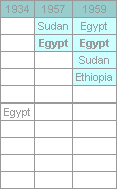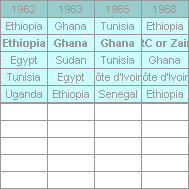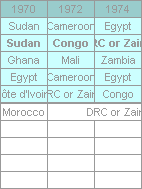It took
until the mid of the 1970's until the population biggest country of Africa
emerged as a powerful football nation and it took until the 90's before
Nigeria finally became the considered superpower of African Football. But
will they stay top? Generations of journalists have been speculating on
the reasons why Nigerians, who are one fifth of the African population
and from early on a traditional footballing nation, seldom were able to
fulfil the expectations that arose from the talent and the richness of
the ressources of players.
The lack of consisteny
was always obvious. Nigeria is a difficult country. 400 people living in
it with 4 major people with languages from different language families.
As normal neither ressources
nor power are not equally distributed and have led to cruel confrontations
in the past but also an ephasizis on a more federal political system. This
situation and past makes Nigeria prototypical for the difficulties many
of those artificial state products of colonialisation are in today. Players,
officials, journalists stem always from a particular background. Whether
this plays a role or not, recently they have been always quarrels in administration
for example about appointments and dismissals of coaches, there have been
problems between players and administration about money, and so on. Apart
from the reginal and ethnic view, also religion devides the country. It
has just been reported that women soccer is about to be banned in a northern
muslim province while the Nigerian national team is the most successful
of Africa and women soccer seems quite popular at least among the christians.
All those problems
add to the case of an maybe 'overtalented' pool. In smaller countries a
selection of top players is no problem because there are only few, and
those players would stay in a team even when having a bad time, such a
team structure can be built. In Nigeria there will be always discussion
and blame.
A team hardly could
have been built: Because of the quarrels and diverging interests there
has been no coach working for a longer period since the Dutch coach Westerhof
pulled out of it 1994, who had worked 4 years and Nigerian Super Eagles
finally had reached new heights.
Since the last world
cup there have been hardly matches and occasions to built a team. Little
more than one month before the Nations Cup 2000 the preperations have begun.
The blame is on the administration, the Nigerian Football Association and
as well counterparts in the sports ministery pointing fingers at each other.
But it is strange,
that many players reflect those inconsistencies in their own careers. They
are a bunch of huge talented stars, remarkably from one particular players
generation, but few of them yet have turned out as valuable for big clubs
over longer periods. In the European media some have become the darlings
of reports about money issues rather than sports, a certain paranoidity
of not being treated fair appears to be reflected. Another problem adds:
When those stars gather, most different attitudes collide, some preaching
disciplined football, some praising the fun they can only have in the National
team.
The intention of superiorty
drawn from particular matches in which they excited the crowds often seems
to lead to a more lacklustre approach of doing work before and in the next
match. Some stars prefer to skip even the few left preperation matches
and do not turn up, being sure to be called up anyway. And some might have
even started to rethink and revalue their personal and club career against
the National team like it has already taken place with stars from minor
huge African football nations.
This all has lead
to devastating preperation results: 1:4 against Spanish 2nd devision club
Compostela and 1:5 against the selection of Basque. Similar preperation
results had characterized the 1998 World Cup preperations, too. The under-20-team
had been disappointing at the under 20 World championship after similar
circumstanzes had marred team building. Them had been star studded favorites
on home soil, too.
BUT. Nigeria are THE
favorites ANYWAY. If they achieve to build a team around their strong in-form
stars Jay-Jay Okocha, Sunday Oliseh, and Nwanko Kanu, they will be excitement
to watch. Their fate might lie to some extent also with the attitude of
their opponents. If those play too carefully and neglecting to target the
Nigerian defence inconsistencies, obtaining rather just to contain the
Nigerians, Nigeria should patiently lure for their chances and win through
the skills of their individuals with a capability to win such a match out
of nothing.
The final is at Lagos
and until then then the 'the tournament builds the team, if you will
stay in it' rule might have applied. The opener against Tunisia will
be a rough test: the North Africans seem in top form. But Nigeria are warned
and reports from the training camp sound confindent: Players and Dutch
coach Jo Bonfrere, who was once before in charge with the team that won
the Olympic title in 1996, seem committed.
back
to top |






